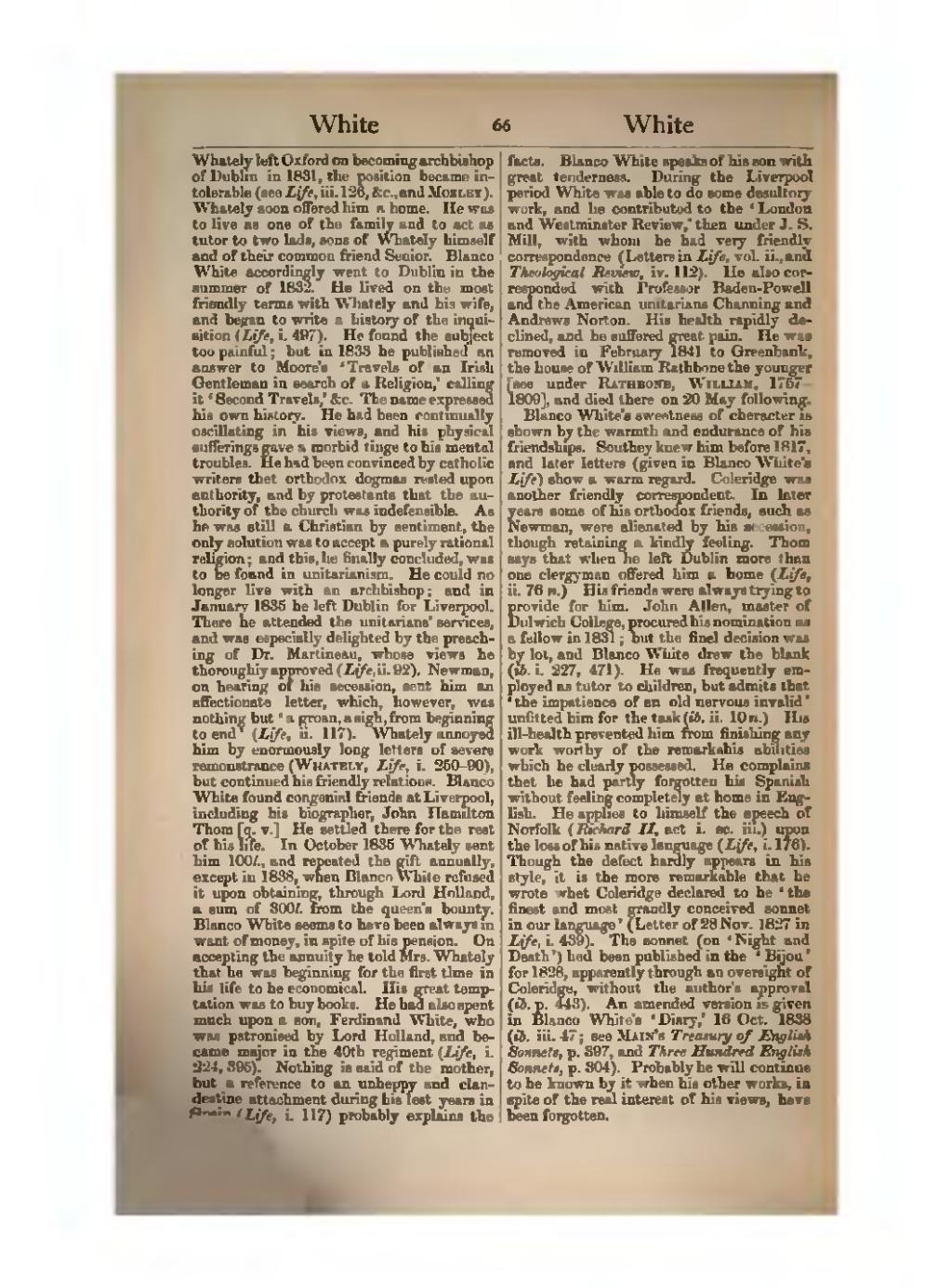Whately left Oxford on becoming archbishop of Dublin in 1831, the position became intolerable (see Life, iii. 126, &c., and Mozley). Whately soon offered him a home. He was to live as one of the family and to act as tutor to two lads, sons of Whately himself and of their common friend Senior. Blanco White accordingly went to Dublin in the summer of 1832. He lived on the most friendly terms with Whately and his wife, and began to write a history of the inquisition (Life, i. 497). He found the subject too painful; but in 1833 he published an answer to Moore's ‘Travels of an Irish Gentleman in search of a Religion,’ calling it ‘Second Travels,’ &c. The name expressed his own history. He had been continually oscillating in his views, and his physical sufferings gave a morbid tinge to his mental troubles. He had been convinced by catholic writers that orthodox dogmas rested upon authority, and by protestants that the authority of the church was indefensible. As he was still a Christian by sentiment, the only solution was to accept a purely rational religion; and this, he finally concluded, was to be found in unitarianism. He could no longer live with an archbishop; and in January 1835 he left Dublin for Liverpool. There he attended the unitarians' services, and was especially delighted by the preaching of Dr. Martineau, whose views he thoroughly approved (Life, ii. 92). Newman, on hearing of his secession, sent him an affectionate letter, which, however, was nothing but ‘a groan, a sigh, from beginning to end’ (Life, ii. 117). Whately annoyed him by enormously long letters of severe remonstrance (Whately, Life, i. 250–90), but continued his friendly relations. Blanco White found congenial friends at Liverpool, including his biographer, John Hamilton Thom [q. v.] He settled there for the rest of his life. In October 1835 Whately sent him 100l., and repeated the gift annually, except in 1838, when Blanco White refused it upon obtaining, through Lord Holland, a sum of 300l. from the queen's bounty. Blanco White seems to have been always in want of money, in spite of his pension. On accepting the annuity he told Mrs. Whately that he was beginning for the first time in his life to be economical. His great temptation was to buy books. He had also spent much upon a son, Ferdinand White, who was patronised by Lord Holland, and became major in the 40th regiment (Life, i. 224, 395). Nothing is said of the mother, but a reference to an unhappy and clandestine attachment during his last years in Spain (Life, i. 117) probably explains the facts. Blanco White speaks of his son with great tenderness. During the Liverpool period White was able to do some desultory work, and he contributed to the ‘London and Westminster Review,’ then under J. S. Mill, with whom he had very friendly correspondence (Letters in Life, vol. ii., and Theological Review, iv. 112). He also corresponded with Professor Baden-Powell and the American unitarians Channing and Andrews Norton. His health rapidly declined, and he suffered great pain. He was removed in February 1841 to Greenbank, the house of William Rathbone the younger [see under Rathbone, William, 1757–1809], and died there on 20 May following.
Blanco White's sweetness of character is shown by the warmth and endurance of his friendships. Southey knew him before 1817, and later letters (given in Blanco White's Life) show a warm regard. Coleridge was another friendly correspondent. In later years some of his orthodox friends, such as Newman, were alienated by his secession, though retaining a kindly feeling. Thom says that when he left Dublin more than one clergyman offered him a home (Life, ii. 76 n.). His friends were always trying to provide for him. John Allen, master of Dulwich College, procured his nomination as a fellow in 1831; but the final decision was by lot, and Blanco White drew the blank (ib. i. 227, 471). He was frequently employed as tutor to children, but admits that ‘the impatience of an old nervous invalid’ unfitted him for the task (ib. ii. 10 n.) His ill-health prevented him from finishing any work worthy of the remarkable abilities which he clearly possessed. He complains that he had partly forgotten his Spanish without feeling completely at home in English. He applies to himself the speech of Norfolk (Richard II, act i. sc. iii.) upon the loss of his native language (Life, i. 176). Though the defect hardly appears in his style, it is the more remarkable that he wrote what Coleridge declared to be ‘the finest and most grandly conceived sonnet in our language’ (Letter of 28 Nov. 1827 in Life, i. 439). The sonnet (on ‘Night and Death’) had been published in the ‘Bijou’ for 1828, apparently through an oversight of Coleridge, without the author's approval (ib. p. 443). An amended version is given in Blanco White's ‘Diary,’ 16 Oct. 1838 (ib. iii. 47; see Main's Treasury of English Sonnets, p. 397, and Three Hundred English Sonnets, p. 304). Probably he will continue to be known by it when his other works, in spite of the real interest of his views, have been forgotten.
